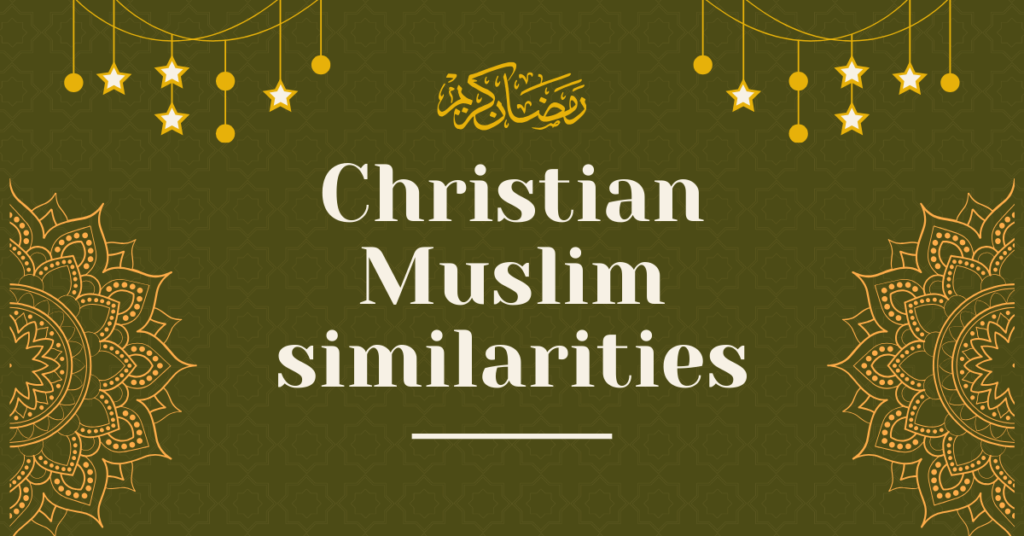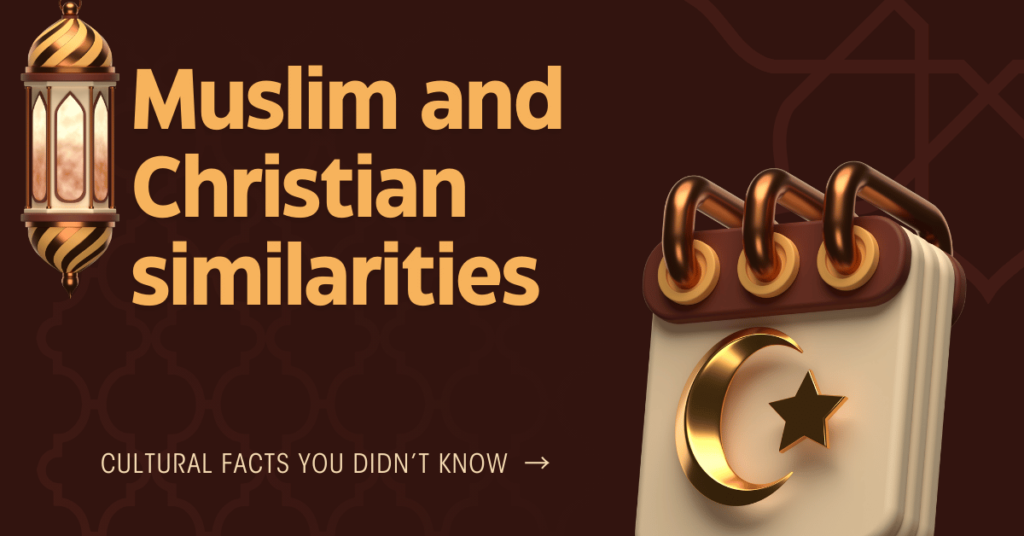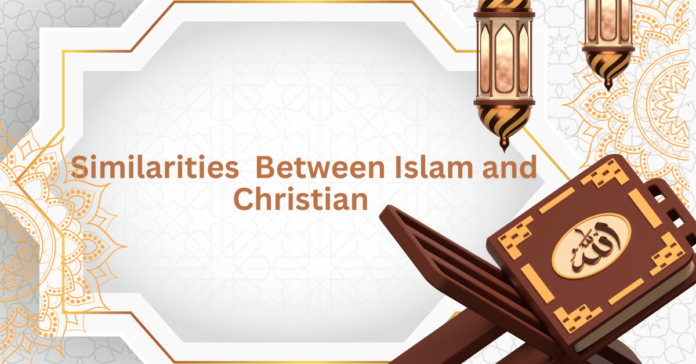Islam and Christianity similarities with Dr Zakir Naik
The Universal Greeting: Peace Be Upon You
Muslims greet with “Assalamu Alaikum” (Peace be upon you), echoing the greeting used by Prophets like Jesus (Isa). The Bible mentions a similar greeting, “Shalom Aleichem”, emphasizing the universal pursuit of peace in both religions.
Scriptures: The Divine Connection
Islam and Christianity similarities: Islam recognizes four major scriptures:
- Torah – Revealed to Moses.
- Zabur – Revealed to David.
- Injil (Gospel) – Revealed to Jesus.
- Quran – The final revelation to Prophet Muhammad.
The Quran stands out as the only scripture preserved in its original form, serving as a universal guide for humanity.
Prophets and Their Mission
- Islam teaches that prophets were sent to every nation, with their messages tailored for their respective peoples.
- The Qur’an mentions 25 prophets by name, including Adam, Noah, Moses, Jesus, and Muhammad (peace be upon them all).
- Prophet Muhammad (PBUH) is described as the seal of the prophets, as noted in Surah Al-Ahzab (33:40):
“Muhammad is not the father of any of your men, but he is the Messenger of Allah and the Seal of the Prophets.”
Jesus and Muhammad: Their Universal Missions
In Islam and Christianity similarities While Jesus (peace be upon him) was sent primarily to the Children of Israel, Prophet Muhammad’s (peace be upon him) mission was for all of humanity. The Quran states:
- “We have sent you [O Muhammad] as a mercy to all the worlds.” (Surah Al-Anbiya, 21:107)
- “This [Quran] is a message for all of humankind.” (Surah Ibrahim, 14:52)
Prophet Muhammad in Religious Scriptures Mention in the Bible
The advent of Prophet Muhammad (peace be upon him) is foretold in:
- Deuteronomy 18:18 – A prophet like Moses, raised among “brethren.”
- Isaiah 29:12 – A prophecy about an unlettered prophet.
- John 16:7–14 – The “Comforter” mentioned aligns with Prophet Muhammad.
- Song of Solomon 5:16 – The Hebrew phrase “Muhammadim” refers to Prophet Muhammad.

Belief in One God (Monotheism)
Islam and Christianity similarities one similarities is Both Islam and Christianity are monotheistic religions, emphasizing the belief in a singular, all-powerful deity.
- In Islam: Allah is described as the one and only God, eternal and absolute, as stated in Surah Al-Ikhlas (Chapter 112): “Say, He is Allah, the One and Only; Allah, the Eternal, the Absolute.”
- In Christianity: The Bible echoes this in Deuteronomy 6:4, “Hear, O Israel: The Lord our God, the Lord is one.”
Reverence for Jesus Christ (Prophet Isa in Islam)
Jesus is a central figure in both religions, though understood differently:
- In Islam: Jesus (Isa) is considered one of the greatest prophets, born of the Virgin Mary (Maryam), and referred to as the Messiah. The Quran states in Surah Al-Maryam (Chapter 19) that Jesus performed miracles by God’s will.
- In Christianity: Jesus is seen as the Son of God and the Savior. His miraculous birth and acts, as recorded in the Gospels, affirm his divinity for Christians.
Sacred Texts as Divine Revelation
Islam and Christianity similarities Both religions hold their sacred texts as divinely revealed:
- In Islam: The Quran is regarded as the final and unaltered word of God, revealed to Prophet Muhammad (peace be upon him).
- In Christianity: The Bible, consisting of the Old and New Testaments, is seen as the inspired word of God.
Similar Moral and Ethical Guidelines
Islam and Christianity similarities Islam and Christianity emphasize compassion, honesty, and service to humanity:
- Charity:
- Islam mandates Zakat, a compulsory charity, to help the poor and needy.
- Christianity advocates generosity, as highlighted in Proverbs 19:17, “Whoever is kind to the poor lends to the Lord.”
- Prohibition of Idolatry: Both condemn idol worship. The Quran in Surah Al-Ma’idah (5:90) warns against associating partners with God, while the Bible in Exodus 20:3-5 explicitly forbids the making and worship of graven images.
Prayer as a Pillar of Worshm
Prayer as Islam and Christianity similarities is a cornerstone in both faiths:
- In Islam: Muslims perform Salah five times daily, with physical prostration symbolizing submission to God.
- In Christianity: Prayer is encouraged as a way to commune with God, as seen in Matthew 6:9-13, where Jesus teaches the Lord’s Prayer.
Islam and Christianity similarities Accountability in the Afterlife
Islam and Christianity similarities: Both Islam and Christianity stress accountability before God and the promise of eternal life:
- In Islam: The Quran describes a Day of Judgment where individuals are rewarded or punished based on their deeds (Surah Al-Zalzalah 99:7-8).
- In Christianity: Similarly, the Bible teaches that all will stand before God for judgment (2 Corinthians 5:10).
Emphasis on Family and Social Justice
Islam and Christianity similarities: Both religions uphold family values and advocate for social justice:
- In Islam: The family is regarded as the cornerstone of society, with clear guidelines for mutual respect among its members.
- In Christianity: Teachings such as Ephesians 6:1-4 emphasize honoring parents and nurturing children in faith.
Respect for Prophets
Islam and Christianity share a respect for several prophets, including Adam, Noah, Abraham, and Moses.
- In Islam: These prophets are considered messengers who brought God’s guidance.
- In Christianity: They are seen as forebearers of Christ’s coming and central figures in salvation history.
The Call to Worship the Same Creator
Both traditions ultimately call humanity to worship the one true Creator, and their scriptures encourage turning to God with humility and devotion.
Islam: A Religion of Peace and Universality
- Islam originates from the root word Salam, meaning peace, and signifies submission to the will of God (Allah).
- It is not a new faith but has existed since the dawn of humanity.
- Prophet Muhammad (PBUH) is recognized as the last and final messenger, sent to guide all of humankind.
The Qur’an emphasizes this universality in Surah Al-Anbiya (21:107):
“We have not sent you, [O Muhammad], except as a mercy to the worlds.”
Jesus (PBUH) in Islam
- Jesus (PBUH) holds a revered position in Islam.
- Muslims believe in his miraculous birth, performed miracles by God’s permission, and consider him a mighty messenger of Allah.
- The Qur’an highlights his mission in Surah Al-Imran (3:49):
“I have come to you with a sign from your Lord.”
Key beliefs about Jesus in Islam:
- Born miraculously without a father.
- Performed miracles, such as healing the blind and reviving the dead, by Allah’s permission.
- Not crucified, but raised to the heavens by Allah.
Muslims and Christians diverge in their understanding of his divinity, with Muslims affirming Jesus (PBUH) as a prophet, not the son of God.
4. The Quran: A Universal Revelation
- The Qur’an is the final divine scripture, revealed for the guidance of all humanity, transcending time and place.
- Previous scriptures, such as the Torah, Zabur (Psalms), and Injil (Gospel), were also divine but meant for specific peoples and eras.
- Unlike earlier scriptures, the Qur’an has been preserved in its original form, as confirmed by critics and scholars.

- The Bible contains prophecies of Prophet Muhammad (PBUH), such as in Deuteronomy 18:18:
“I will raise up for them a prophet like you from among their brothers; I will put my words in his mouth.” - This prophecy aligns with Muhammad (PBUH), as he:
- Had a natural birth (unlike Jesus).
- Was accepted by his people.
- Was both a spiritual leader and a statesman.
Islam and Christianity similarities: In the New Testament, the term Parakletos, translated as “Comforter” in John 14:16, is interpreted by Muslims to refer to Prophet Muhammad (PBUH).
6. Core Message of Monotheism
- Both Islam and Christianity emphasize monotheism, the belief in one God.
- Islam rejects any form of polytheism and associates Allah with absolute sovereignty and mercy.
The Qur’an states in Surah Al-Ikhlas (112:1-4):
“Say, He is Allah, [who is] One, Allah, the Eternal Refuge.”
7. Respect for Religious Diversity
- Islam acknowledges the divine origin of previous scriptures and respects the faiths of Christians and Jews, referring to them as “People of the Book.”
- This inclusivity reflects Islam’s emphasis on dialogue and mutual respect among faiths.
Similarities Between Islam and Christianity: A Comprehensive Insight

Understanding Islam and Its Roots
The word Islam derives from the Arabic root “Salam,” meaning peace. It signifies submission to the will of Almighty God (Allah). Contrary to misconceptions, Islam is not a new religion. It is believed to have existed since the dawn of humanity, with Prophet Muhammad (peace be upon him) as the final messenger, not its founder.
Both faiths recognize a lineage of prophets sent by God. Islam requires belief in all messengers, including Adam, Noah, Abraham, Moses, and Jesus (peace be upon them all). The Quran and Bible narrate the lives of these prophets, emphasizing their divine mission to guide humanity.
Islam and Christianity similarities: These prophecies highlight striking similarities between Moses and Muhammad:
- Both were natural-born, married, and had children.
- Both were accepted by their people and served as religious leaders and statesmen.
- Unlike Jesus, who did not rule a kingdom, both Moses and Muhammad governed their nations.
Islam’s Pillars: Foundations of Faith
Islam and Christianity similarities: Islam is built on five pillars:
- Shahada – Testimony of faith: “There is no god but Allah, and Muhammad is His messenger.”
- Salah – Prayer performed five times daily.
- Zakat – Obligatory charity for the poor.
- Sawm – Fasting during Ramadan.
- Hajj – Pilgrimage to Mecca.
These practices emphasize submission, compassion, and community service, values also cherished in Christianity.

Commonalities in Ethics and Morals
Islam and Christianity similarities Both Islam and Christianity advocate:
- Monotheism – Worship of one God.
- Charity and kindness – Helping the poor and needy.
- Love and forgiveness – Core values preached by both Jesus and Muhammad.
- Belief in life after death – A central theme in both religions.
Conclusion
Islam and Christianity similarities: Islam and Christianity, despite their differences, have profound commonalities that reflect shared values and beliefs. Understanding these similarities can bridge gaps and promote peaceful coexistence. Both faiths remind humanity of the importance of compassion, morality, and accountability before God, offering a shared vision for a better world. read more articles on Islam and Christianity similarities to stay connected

